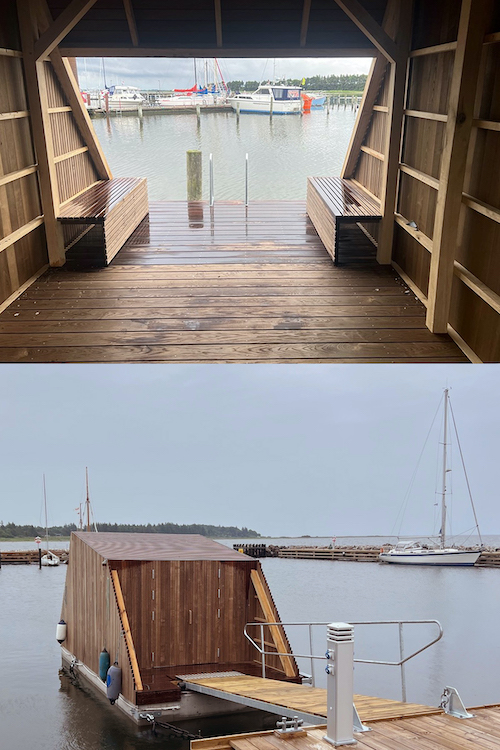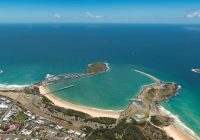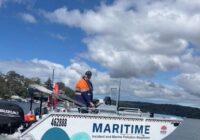Setting aside any emotion about last nights World Cup Soccer results, one would have agree that the Danish are onto something good here. They took our Mary, so maybe we can take this back in return.
For many tourists, Denmark’s natural beauty is best experienced up close—including on the water. That’s why Destination Nordvestkysten (Northwest Coast) has added four floating cabins to its array of unique overnight accommodations. Constructed on environmentally-friendly SF Marina concrete pontoons, each four-person shelter has an exceptionally low freeboard to amplify the aquatic surroundings and allows its guests to sleep side by side with nature.

Destination Nordvestkysten’s four floating cabins are located throughout the Limfjord, the shallow strait in northwest Denmark with inlets from the North Sea and the Kattegat, in Amtoft Havn, Vilsund, Doverodde and Agger Havn. Each site is unique, offering its guests a one-of-a-kind experience such as Cold Hawaii, an international surfing destination. Typical of Scandinavian design, the structures are elegantly simple and functional. Constructed entirely of wood by carpenters GJ Tømrer & Snedker ApS, they feature rear walls that open fully to create stunning panoramic views.
The cabins are built atop 3m W x 6.8m L SF Marina SF1000 Series pontoons. Due to their unique geometry and sheer mass, they’re extremely stable—an important consideration when the water is just inches from the floor of the space.
Maintenance-free and virtually unsinkable, SF Marina pontoons have even been used as the foundation of a two-story, 33-room floating hotel in Sweden. While the Destination Nordvestkysten structures are intentionally minimalistic, the pontoons are routinely built with integrated channels for water, power and other utilities. Secured to the docks with chain and 2-ton concrete anchors on the seabed, they’re accessed via 1.2m W x 5m L galvanized steel walkways.
Unlike plastic or expanded foam buoyancy solutions, everything about SF Marina floating concrete pontoons—from manufacturing to transportation to anchoring—is sustainable. Beyond providing the ability to create a living space without the environmental impact of traditional land-based construction, the pontoons don’t affect aquatic flora and fauna or affect water flow.
Since 1918, Gothenburg, Sweden-based SF Marina has engineered and manufactured floating breakwaters and concrete dock pontoons, and related marine structures that are built to withstand extreme weather events. Through a robust network of international offices, it has completed recreational and commercial projects around the globe.
For more information on SF Marina visit www.sfmarina.com.







